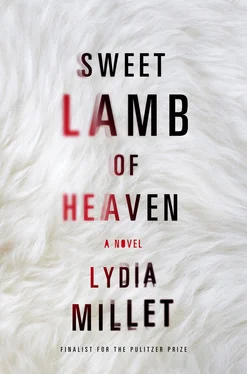Before I got pregnant he found me attractive enough too, I guess, but this disappeared with the pregnancy, which he found repulsive. He pursued other women with unqualified success. He had no lasting feelings for any of them either, as far as I could tell, but each was new in her turn, and Ned prizes novelty. Novelty and momentum are his two passions.
In saying he married me for money, I don’t mean to imply I was an heiress — my family had the complacent, middling inherited wealth that passes without much notice unless you happen to be Ned, brought up in poverty, entrepreneurial, and with an incentive to research. He could have held out for someone with far more money and far, far better connections, for I had none.
Now, looking back, I’m surprised he didn’t. I was a small fish, very small. I had barely enough. But he was impatient to get his enterprises off the ground. And his disinterest in the marriage probably reflected his own awareness of that hasty choice — the fact that he’d settled for much less than he was capable of getting.
WITH A HANDFUL of exceptions I found that when I tried to write down what the voice said, I couldn’t. A fog would descend. Phrases that seemed sharply etched to me when I heard them, sense and structure cut like a skyscraper against a crisp sky, would crumble and fade as soon as I tried to record them.
I heard the words in the stream as English or French or Spanish, or sometimes it would be modern English in an accent or dialect, say Australian English or an English with Welsh accents. Other times it was English that sounded like Shakespeare or Middle English, like Chaucer maybe, which I’d read in college. But whenever the format changed I half-forgot what had come before, as though the switch between lexicons and grammars occurred imperceptibly. Since I couldn’t identify the languages that weren’t English or Spanish or French I figured my imagination was making up a stream of nonsense, sounds that resembled other tongues but were only a sham.
That was a game I’d liked to play when I was a kid. I even played it a few times with Lena, speaking in rapid-fire gibberish, pretending it was an unknown exotic language, say Urdu or Tahitian.
And the voice never went silent, except when Lena was sleeping. It changed from low tones to high, speech to singing, singing to humming to clicking sounds that had a rhythmic quality, on occasion devolving into grumbling or even yelling. I drew the line at yelling — at those times I’d call a babysitter and go out.
I’d shut the door behind me and step into the street, and right away I didn’t hear a thing.
WHEN I LEFT Ned, I took enough money to live on for a while. It was only a fraction of the legacy from my family that he’d funneled into his businesses, but I didn’t want to fight over money. Ned wanted it more than I ever had and taking too much would bring out the edge in him.
So I took only what I felt I needed. I made a budget carefully, knowing I wasn’t going to work again until Lena started school. I’d worked steadily all my adult life and I thought I could use a break; I was well pleased to be only her mother and teacher for those years. I didn’t plan to have a second child.
The money keeps us afloat, Lena and me, and in that respect we’re fortunate.
I PUZZLED OVER the link between the baby’s presence and my hallucination. There wasn’t generally supposed to be such a clear connection, in the hallucinations of the sane, between what was heard or seen and the fixations of the hallucinating person — not in the descriptions that I read, anyway. This made my case seem more psychological than purely neurological, and I worried about it periodically. Because the presence of my infant carried with it a voice that had the appearance of fluency in all tongues and gave an impression of encyclopedic knowledge — some kind of frightened projection of my overpowering responsibility as a mother, possibly, was one of my interpretations.
Sometimes the stream of sound wasn’t a voice but music, welcome relief: old standards, dramatic epics by well-known composers, folk tunes, pop riffs. It liked Woody Guthrie, whose music I didn’t remember encountering before except for the song “This Land Is Your Land,” which I knew from summer camp. Research on the snatches of lyrics I could recall yielded his name, and I thought I must have been exposed as a child, and quashed the recollection.
But most often the content was words — what sounded like recitations of texts of all kinds, poems, fictions both literary and mass-market, movie scripts and stage plays, histories, dictionaries, textbooks, biographies, news stories. The subjects were as diverse as the genres: single-celled organisms, hockey scores, feathers on dinosaurs, celebrity suicides, the pattern of Pleistocene extinctions, the fate of the tribe known as the Nez Perce; relativity, particle accelerators, Greek myths, the troubled term Anthropocene , the chemistry of a callus on the hand of Heidelberg man.
I was impressed by the knowledge base from which my mind appeared to be drawing. I marveled at it, even. Buried in my unconscious must be some capacity for photographic memory, I thought.
That surprised me.
Nothing salacious ever came from the voice — that is, there were curses, there was profanity, there were even vague references to sex and reproduction, but there was never a suggestion of lechery directed toward me personally. Still, I felt perversion was implicit in the combination of a baby nursing while a stream of elevated diction flowed up from somewhere beyond the O of her mouth. I had to distance myself from the voice when I was nursing her: it might be my hallucination, but, much in the way I might detest my head lice or my chicken pox, should those happen to manifest, I was forced, at those times, to treat it as a pest.
On occasion I’d try hard to write down what I heard despite my confusion, with doggedness but a lack of clarity, determined to record the substance of the hallucinated event. I still carry with me some scraps of paper — deep in the trunk, where I stuck the file after the last time I picked through it. I’d had to write the words down fast to get any of them, seldom had time to get to the keyboard, so the notes are scribbled on the backs of envelopes, grocery and housewares receipts, once along the edge of a worn dollar bill. Many seemed nonsensical: Windlessness = illusion planet is static in space ∴ windlessness entropic. Or “social animals + writing: ERRATUM.”
Neighbors and friends came over fairly often in the first year of Lena’s life and (of course) they never heard the voice, not even the faintest hint of it — I made sure. I’d ask, in a roundabout, casual way, if anyone was hearing anything unusual as we sat there, but my questions always met with offhand dismissals.
Joan of Arc had heard a voice advising her to help raise the siege of Orleans, but as far as I could tell the voice had no specific instructions for the likes of me.
I PASSED THROUGH stages with my hallucination. Sometimes I wished I could hide from it, other times I was determined to study it steadfastly until I could pick out the details and know it more perfectly. After almost a year I fit myself into a certain orbit, adjusting my routine to its disruptions. I shrank and disappeared in the brightness of its perpetual day but at night, when it was silent and so was Lena, I tracked across the dark relief in solitary flight.
I relied heavily on the fact that babies sleep for longer than adults and I also depended on her midday nap, an hour and a half like clockwork. The babysitters gave me some time off, and for the rest I’d found ways to fit myself into the spaces between words, to distract myself sometimes, at other times to tolerate nearness and even, when well-rested, to listen.
Читать дальше












